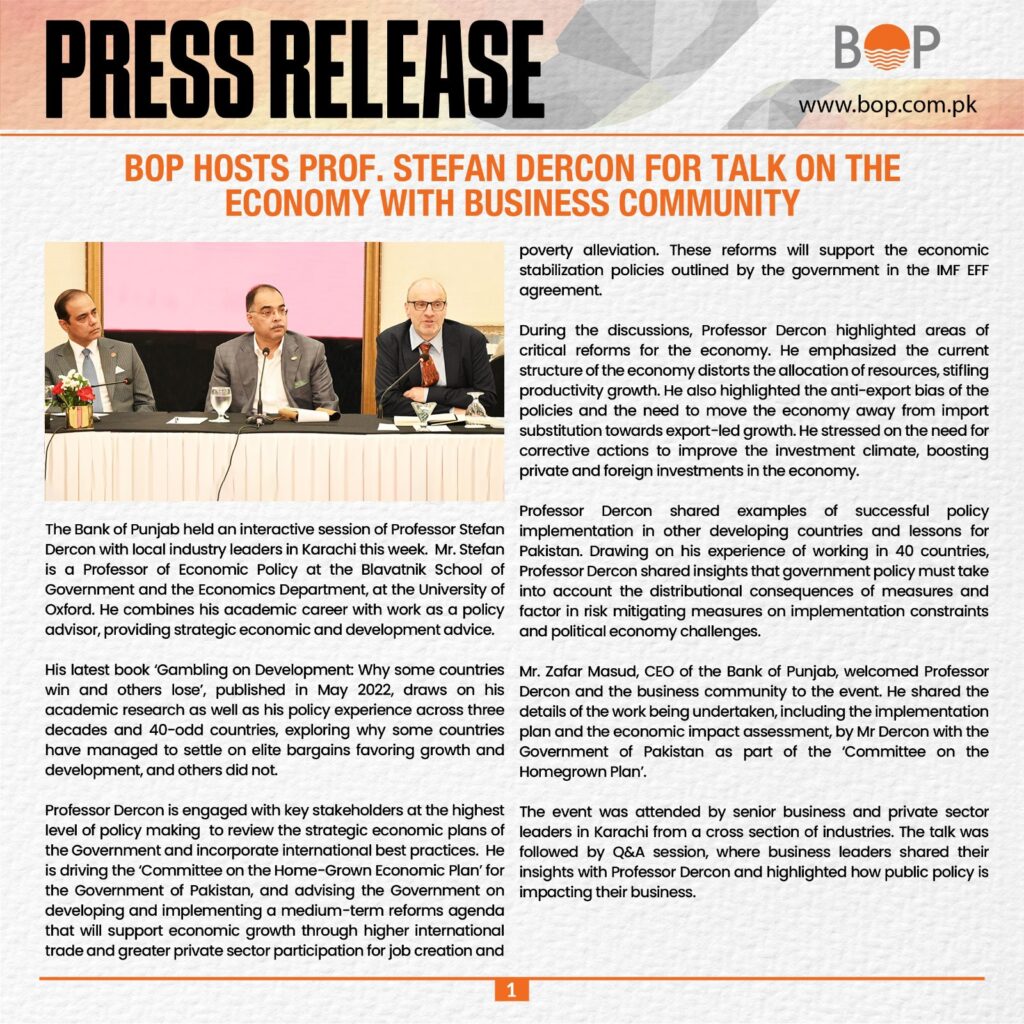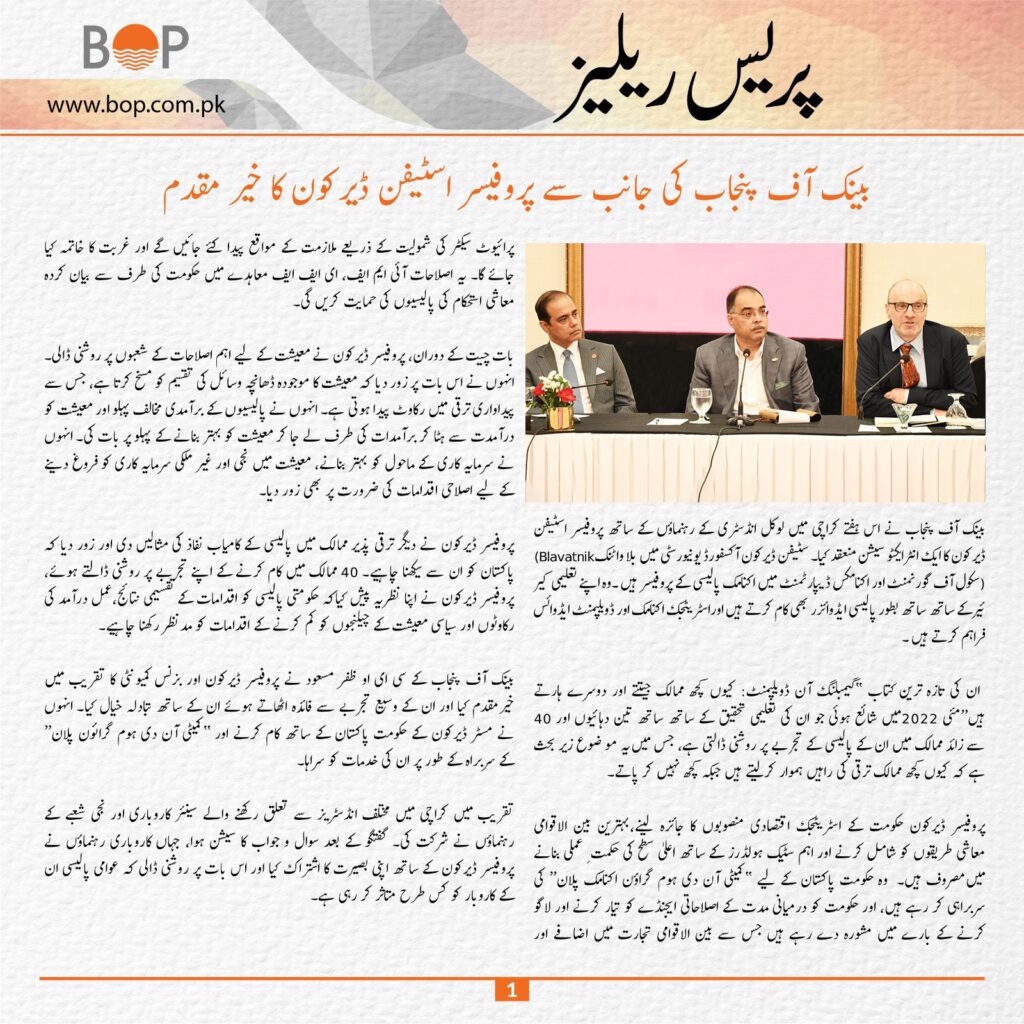The Bank of Punjab hosted Oxford’s Prof. Stefan Dercon in Karachi for a discussion on economic reforms.
Prof. Stefan Dercon, a renowned economic policy expert from Oxford, shared his expertise and highlighted key areas for growth, including the shift towards export-led growth and improving investment climate.
The event, attended by senior industry figures, concluded with a dynamic Q&A session
The Bank of Punjab held an interactive session of Prof. Stefan Dercon with local industry leaders in Karachi this week. Mr. Stefan is a Professor of Economic Policy at the Blavatnik School of Government and the Economics Department, at the University of Oxford. He combines his academic career with work as a policy advisor, providing strategic economic and development advice.
His latest book ‘Gambling on Development: Why some countries win and others lose’, published in May 2022, draws on his academic research as well as his policy experience across three decades and 40-odd countries, exploring why some countries have managed to settle on elite bargains favoring growth and development, and others did not.
Prof. Stefan Dercon is engaged with key stakeholders at the highest level of policy making to review the strategic economic plans of the Government and incorporate international best practices. He is driving the ‘Committee on the Home-Grown Economic Plan’ for the Government of Pakistan, and advising the Government on developing and implementing a medium-term reforms agenda that will support economic growth through higher international trade and greater private sector participation for job creation and poverty alleviation. These reforms will support the economic stabilization policies outlined by the government in the IMF EFF agreement.
During the discussions, Prof. Stefan Dercon highlighted areas of critical reforms for the economy. He emphasized the current structure of the economy distorts the allocation of resources, stifling productivity growth. He also highlighted the anti-export bias of the policies and the need to move the economy away from import substitution towards export-led growth. He stressed on the need for corrective actions to improve the investment climate, boosting private and foreign investments in the economy.
Prof. Stefan Dercon shared examples of successful policy implementation in other developing countries and lessons for Pakistan. Drawing on his experience of working in 40 countries, Professor Dercon shared insights that government policy must take into account the distributional consequences of measures and factor in risk mitigating measures on implementation constraints and political economy challenges.
Mr. Zafar Masud, CEO of the Bank of Punjab, welcomed Prof. Stefan Dercon and the business community to the event. He shared the details of the work being undertaken, including the implementation plan and the economic impact assessment, by Prof. Stefan Dercon with the Government of Pakistan as part of the ‘Committee on the Homegrown Plan’.
About Prof. Stefan Dercon
Professor Stefan Dercon is a highly respected economist specializing in development economics, with a particular focus on Africa. He holds the position of Professor of Economic Policy at the Blavatnik School ofGovernment, University of Oxford.
Key Areas of Expertise
Dercon’s research primarily revolves around understanding poverty and vulnerability in developing countries, especially in Africa. He has conducted extensive fieldwork and analysis to examine the factors that contribute to poverty and how to effectively address them.
Notable Contributions
- Author of influential books and articles: Dercon has published numerous works that have shaped the discourse on development economics and poverty reduction.
- Advisor to policymakers: His insights have influenced the policies of governments and international organizations working to improve the lives of people in developing countries.
- Champion of evidence-based policymaking: Dercon is a strong advocate for using rigorous research to inform development interventions.
Focus on Africa and Poverty
Professor Stefan Dercon has made significant contributions to our understanding of poverty and development, particularly in the African context. His research often delves into:
- The underlying causes of poverty: He examines factors such as economic shocks, governance issues, and social inequalities that contribute to persistent poverty.
- Vulnerability to shocks: Dercon studies how events like droughts, economic crises, or health emergencies impact vulnerable populations and how to build resilience.
- Impact of development interventions: His research evaluates the effectiveness of different aid programs and policies in reducing poverty and improving livelihoods.
Recent Work and Insights
Dercon’s latest book, “Gambling on Development: Why some countries win and others lose” offers valuable insights into why some nations manage to achieve sustained economic growth and development while others struggle. He explores the role of political economy, institutions, and leadership in shaping development outcomes.
Policy Impact
Professor Dercon’s work has had a substantial impact on policymaking. He has served as the Chief Economist of the UK Department for International Development (DFID), where he played a crucial role in shaping the UK’s aid strategy. His emphasis on evidence-based policymaking has influenced development agendas globally.

